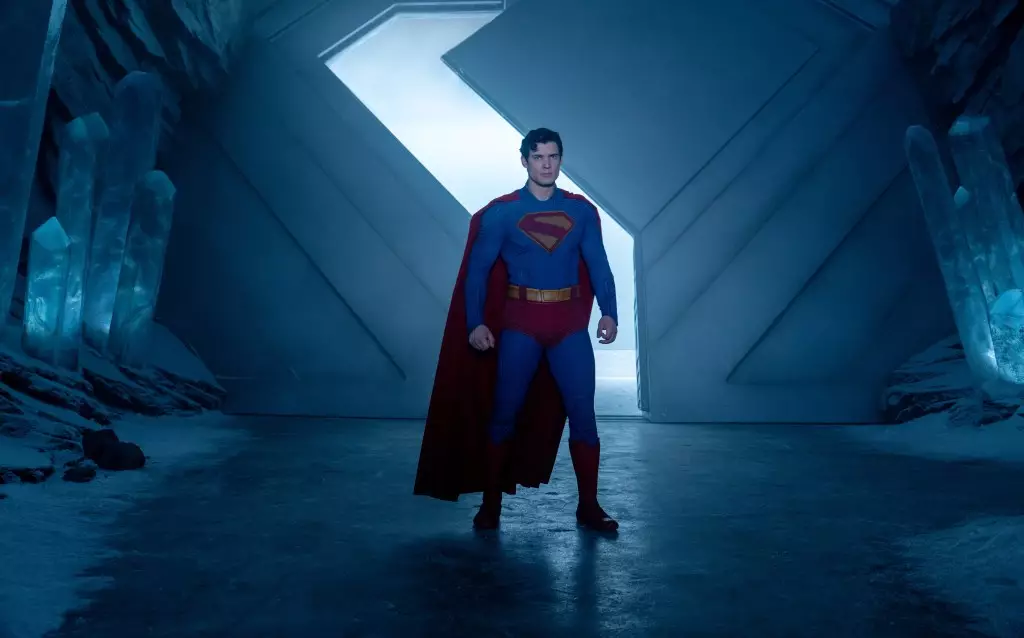Superman’s latest cinematic incarnation, helmed by James Gunn, has launched into theaters with considerable fanfare, posting impressive early figures across multiple markets. Yet, beneath the surface of these strong initial numbers lies a complex reality: the character’s relevance is being tested more fiercely than ever before. While the opening weekend’s international and domestic numbers appear promising on paper, they fail to address the deeper issues of audience engagement and cultural resonance. Instead of simply celebrating the launch, we must critically analyze whether Superman’s appeal can withstand the shifting tides of popular sentiment and market fatigue.
Despite the sizeable $40.3 million accrued in North America and abroad, these figures may mask a deeper problem: is Superman still a viable cultural icon that can adapt and thrive in today’s bloated superhero landscape? Historically, comic book heroes have enjoyed cycles of popularity, but the current cinematic landscape feels overcrowded and increasingly homogenized. Superman, once a symbol of hope and moral clarity, now risks becoming one more character in a crowded genre that struggles to surprise or inspire. The initial box office success is undeniably strong, but it may merely reflect nostalgia or a limited curiosity, not sustained cultural relevance.
Market Performance: A Mixed Signal
Looking at the varied international results, certain markets reveal interesting insights. France, for example, saw a solid $1.3 million in previews, just slightly above comparable Marvel and Sony releases. Italy and Indonesia also demonstrated strong showings, with figures comparable or surpassing previous superhero blockbusters and even notable DC titles. This indicates that Superman still carries a degree of international appeal—yet, these figures are not uniformly indicative of lasting success. For instance, Korea’s market, already known for its cautious appetite for Western blockbusters, portrayed restrained enthusiasm, with the opening numbers matching more modest releases like Guardians of the Galaxy. This suggests that Superman’s international appeal remains limited and market-dependent.
More telling is the performance in Brazil, which posted the biggest opening day ever for James Gunn, signaling that among certain demographics, there remains a fervent fan base. However, at the same time, the fact that the numbers are being driven by market-specific factors—like regional branding, cultural dimensions, and promotional strategies—raises questions about whether this enthusiasm can be sustained beyond the initial weeks. If Superman’s future relies heavily on international markets with nuanced tastes and competing entertainment options, the long-term outlook becomes more uncertain.
Financials Versus Cultural Impact
Initial box office figures, especially record-breaking openings in countries like Mexico, Australia, and Brazil, paint a picture of a hero still capable of drawing crowds. Yet, focusing solely on these metrics risks oversimplifying the conversation. The superhero genre as a whole faces a paradox: enormous initial profits are often followed by rapid declines, and audience fatigue is a tangible threat. Superman’s recent relaunch needs more than just opening weekend success to prove its relevance; it must demonstrate staying power and cultural renewal.
Furthermore, the commercial triumph cannot ignore the underlying cultural shifts. Younger generations are increasingly skeptical of monolithic heroes with unchanging moral codes. Superman, as a symbol historically rooted in aspiration and moral absolutism, may struggle to resonate with a society craving complexity and relatability. Gunn’s version, while a fresh attempt, risks falling into the trap of formulaic superhero storytelling that appeals mainly to hardcore fans rather than broader audiences.
Will Superman Evolve or Fade Away?
The key question remains: can Superman evolve within the current entertainment ecosystem? The initial numbers suggest an opportunity, but they also highlight inherent risks. The character’s endurance now hinges less on spectacular opening figures and more on meaningful storytelling, cultural connection, and relevance. Addressing the cultural anxieties, moral uncertainties, and diverse audience expectations is essential for Superman to stay afloat amid cutthroat competition.
In the end, Superman’s fate appears to be a microcosm of a larger crisis in superhero cinema—balancing nostalgia with innovation, commercial success with cultural significance. If the franchise relies solely on initial box office triumphs, it risks becoming another fleeting phenomenon. But if it leverages its iconic status to refine its storytelling and genuinely connect with a changing society, Superman might yet transcend its current hurdles and reaffirm its place in the pantheon of enduring heroes.


Leave a Reply